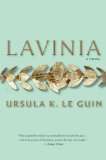Summary | Excerpt | Reading Guide | Reviews | Beyond the Book | Readalikes | Genres & Themes | Author Bio

Critics' Opinion:
Readers' Opinion:
First Published:
Apr 2008, 288 pages
Paperback:
Apr 2009, 288 pages
 Book Reviewed by:
Book Reviewed by:
Kim Kovacs
Buy This Book
I know that there will be far greater kings of far greater kingdoms than Latinus of Latium, my father. Upriver at Seven Hills there used to be two little fortified places with dirt walls, Janiculum and Saturnia; then some Greek settlers came, rebuilt on the hillside, and called their fort and town Pallanteum. My poet tried to describe to me that place as he knew it when when he was alive, or will know it when he lives, I should say, for although he was dying when he came to me, and has been dead a long time now, he hasn’t yet been born. He is among those who wait on the far side of the forgetful river. He hasn’t forgotten me yet, but he will, when at last he comes to be born, swimming across that milky water. When he first imagines me he won’t know that he is yet to meet me in the forest of Albunea. Anyhow, he told me that in time to come, where that village is now, the Seven Hills and the valleys among the hills and all the river banks will be covered for miles with an unimaginable city. There will be temples of marble splendid with gold on the hilltops, wide arched gates, innumerable figures carved of marble and bronze; more people will pass through the Forum of that city in a single day, he said, than I will see in all the towns and farmsteads, on all the roads, in all the festivals and battlefields of Latium, in all my life. The king of that city will be the great ruler of the world, so great that he will despise the name of king and be known only as the one made great with holy power, the august. All the peoples of all the lands will bow to him and bring tribute. I believe this, knowing that my poet always speaks the truth, if not always the whole truth. Not even a poet can speak the whole truth.
But in my girlhood his great city was a rough little town built up against the slope of a rocky hill full of caves and overgrown with thick scrub. I went there once with my father, a day’s sail up the river on the west wind. The king there, Evander, an ally of ours, was an exile from Greece, and in some trouble here too — he had killed a guest. He’d had sufficient reason for it, but that sort of thing doesn’t get forgotten by our country folk. He was grateful for my father’s favor and did his best to entertain us, but he lived far more poorly than our wealthy farmers. Pallanteum was a dark stockade, huddled under trees between the wide yellow river and the forested hills. They gave us a feast, of course, beef and venison, but served it very strangely: we had to lie down on benches at small tables, instead of sitting all together at one long table. That was the Greek fashion. And they didn’t keep the sacred salt and meal on the table. That worried me all through the meal.
Evander’s son Pallas, who was about my age, eleven or twelve then, a nice boy, told me a story about a huge beast-man that used to live up there in one of the caves and came out in twilight to steal cattle and tear people to pieces. He was seldom seen, but left great footprints. A Greek hero called Ercles came by and killed the beast-man. What was he called? I asked, and Pallas said Cacus. I knew that that meant the fire-lord, the chief man of a tribal settlement, who kept Vesta alight for the people of the neighborhood, with the help of his daughters, as my father did. But I didn’t want to contradict the Greeks’ story of the beast-man, which was more exciting than mine.
Pallas asked me if I’d like to see a she-wolf’s den, and I said yes, and he took me to a cave called the Lupercal, quite near the village. It was sacred to Pan, he said, which seemed to be what the Greeks called our grandfather Faunus. Anyhow, the settlers let the wolf and her cubs alone, wisely, and she let them alone too. She never even hurt their dogs, though wolves hate dogs. There were plenty of deer for her in those hills. Now and then in spring she’d take a lamb. They counted that as sacrifice, and when she didn’t take a lamb, they’d sacrifice a dog to her. Her mate had disappeared this past winter.
Copyright © 2008 by Ursula K. Le Guin

The Funeral Cryer by Wenyan Lu
Debut novelist Wenyan Lu brings us this witty yet profound story about one woman's midlife reawakening in contemporary rural China.
Your guide toexceptional books
BookBrowse seeks out and recommends the best in contemporary fiction and nonfiction—books that not only engage and entertain but also deepen our understanding of ourselves and the world around us.